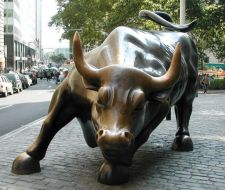If you’ve been following the economic news you’ve probably noticed the past couple of weeks have been very crazy. Here’s a quick overview of some of the more significant events that happened lately:
September 7, 2008
A bit more than a week ago the US government nationalized Fannie Mae and Freddie Mac, the two biggest mortgage companies in the US. The Treasury shelved out $200 billion to keep Fannie and Freddie solvent. Freddie and Fannie hold or guarantee over $5 trillion in mortgages – which is nearly half of all of the US’ outstanding home loan debt.
September 15, 2008
Investment bank Lehman Brothers goes belly up, files for Chapter 11. There were some parties interested in acquiring Lehman, such as Barclays and Bank of America, but they stepped away as the Fed refused to intervene like it did with Bear Stearns in March. Lehman’s debt was $613 billion against total assets of $639 billion. Apparently, Lehman was not too big to fail. The previous largest bankruptcy was WorldCom in July 2002, they had $107 billion worth of assets.
A day earlier Merrill Lynch sold itself to Bank of America for $38.25 billion in stock. Only two independent Wall Street investment banks remain: Goldman Sachs and Morgan Stanley.
September 16, 2008
Insurance giant AIG is in trouble. The collapse of this firm would be a disaster for the financial system so the Fed bails out the private firm by giving them a loan of up to $85 billion in exchange for an equity stake of almost 80% in AIG. This was the largest government bailout of a private company in US history.
September 17, 2008
In the last couple of months gold had fallen back from a bit more than $1,000 per ounce to the $700s but on Wednesday scared investors pushed the precious metal up by more than 11% from $780 to $837. This was the biggest 1-day gain ever for gold. Meanwhile, the Dow drops 450 points to its lowest level in almost 3 years and Nasdaq posts its first triple-digit loss since the September 11 attacks.

September 18, 2008
The SEC bans naked short selling. Shorting a stock means you borrow a stock with the aim of selling it and buying it back at a lower price – you gain money if a stock drops and lose money if a stock rises. Naked shorting means you’re shorting a stock without borrowing it, some experts (partly) blame this financial instrument for the large drop of some stocks.
The British FSA bans shorting of 29 financial firms until January 16, 2009.
British financial institution Lloyds TSB takes over troubled banking and insurance group HBOS for £12.2 billion (around $21.85 billion).
Central banks pump $180 billion into the money markets.
Morgan Stanley needs more capital and is in talks with suitors, China Investment Corp (CIC) might acquire a 49% stake in Morgan Stanley but it’s also possible that the investment bank will be acquired by Wachovia.
Washington Mutual, the largest savings and loan association in the US, is also a takeover target. It’s rumoured that Citigroup, Bank of America, JPMorgan Chase and Wells Fargo are interested in WaMu.
The American indexes make a spectacular recovery after Henry Paulson, United States Secretary of the Treasury, proposes to create a new “bad bank”. The Dow Jones jumps 3.9 percent higher and stocks of financial institutions skyrocket.
The bad bank would be a huge bailout plan for the banks, it would be somewhat similar to the Resolution Trust Corporation plan which helped to clean the banks of junk debt in the late 1980s and early 1990s (Savings and Loan crisis). This bailout plan would be designed to remove illiquid junk from the balance sheets of financial institutions and will hopefully solve the crisis and restore confidence in the banking system. This would be one of the largest interventions in the financial markets since the 1930s. The costs involved with the bailout of the banks will be massive, it’s suggested it will be at least $500 billion but some sources believe it’s closer to $1.2 trillion. Bad news for the US tax payer but the alternative could have been worse. Without a bailout the financial system might get disrupted a lot harder, credit to families and businesses could dry up almost completely and the economy would take an even larger hit. The bailout could be seen as a huge investment into the economy, the US government will receive the ‘toxic junk’ from the banks but if everything goes well these assets could be worth a lot more within a couple of years. I’ve heard Sweden did something similar with a bad bank in the 1990s and their bailout turned out to be profitable.
September 19, 2008
SEC outlaws shorting of 799 financial stocks until at least October 2nd. Other countries, including Belgium, are preparing similar actions in an attempt to calm down the markets.
Another big rally for many European and American stock indexes. Big gains for the financials.
Some new updates (added September 22, 2008):
September 21, 2008
The bank bailout is expected to cost $700 billion. That’s several hundreds of billions more than the GDP of a small country like Belgium.
September 22, 2008
The final two Wall Street investment banks announce big changes to their business model and will become “normal banks”. Shaking off their investment bank profile will make it easier for Goldman Sachs and Morgan Stanley to raise new capital and will enable them to get loans directly from the Fed.
Dollar drops while oil has a massive gain. Crude futures topped $130 today, a $25 gain, but slipped back to $120 afterwards.